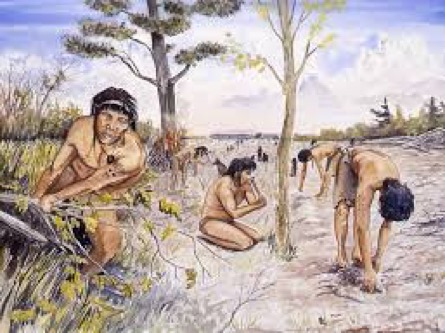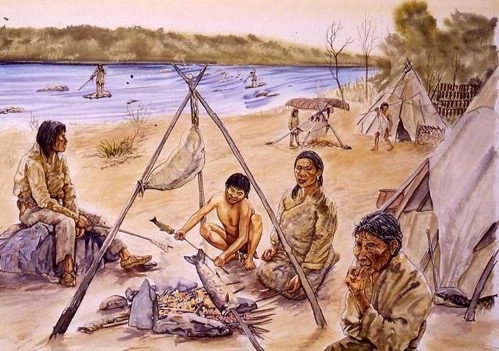The Anishinabek people of the Upper Ottawa region have been here for at least six thousand years, back when the land was covered by a thick layers of glacial ice.
The ice began to melt around nine thousand years ago, and it took over 600 years for the major part of the ice in our area to disappear. The world that appeared in its wake was a harsh environment where fighting for survival was a daily struggle. Our ancestors lived off the land and hunted caribou to stay alive. As the climate continued to warm and the ice melted away, the caribou moved northward, making room for the arrival of animals like moose, deer, beaver and rabbits. A new ecosystem was taking shape, and in the end, it evolved into the one that supports the same vegetation and wildlife we see today.
By 2500 BCE our ancestors had adapted to these changes. They learned how to use the bounty of the new environment and focused their efforts on fishing and hunting smaller mammals, although big game still remained an important part of their diet. Meanwhile, an economy based on harvesting and trading had blossomed.
Our positioning along a major water route between the Atlantic coast and the continental interior meant we were intimately involved in all the important inter-tribal trade that pre-dated the arrival of the French. Our neighbouring tribes were the Nipissing and Ojibway to the west; the Crees to the North; the Mi'gmaq, Montagnais, Hurons, and Atikamekw to the East; and the Iroquois to the South. Among our closest economic trading partners were the Hurons. We traded furs and dried fish in exchange for their corn and cornmeal, wampums and fishnets.
Our ancestors had a regular seasonal routine based on their relationship with the land. Families would spend the winter in their territory hunting, fishing and trapping. In the Spring, we would assemble with other families at strategic locations like Mattawa or the Long Sault rapids on Lake Temiscaming. Lake Temiscaming gets its name from our term Temia’gamin, or “deep lake.” Our gathering places had abundant resources - especially fish. Fish sustained us through the summer months. Much like summers today, the season was a time for visiting, marriages, and extended family celebrations. Our traditional structures of social and political organization allowed us to ensure that the lands were managed in a sustainable way for future generations.



